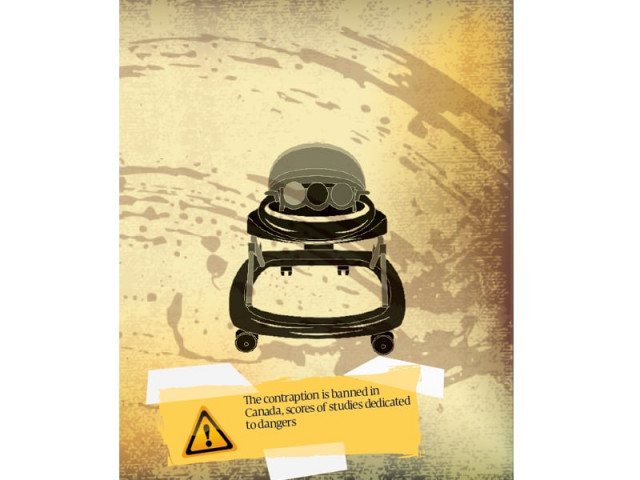Growing pains: Baby walkers slow development, lead to injuries says experts
The contraption is banned in Canada, scores of studies dedicated to dangers.

A walker is often the first thing on a couple’s to-buy list as soon as their baby hits six months. However studies throughout the world have proved that this contraption can do more harm than good. In fact, these devices, which supposedly provide perambulatory support, were banned in Canada in 2004. In the US, the American Academy of Paediatrics has recommended a ban. People continue to use them in Pakistan, however.
The problem is the injuries they cause, explains paediatrician Dr Sohail Thobani. It is common for parents to buy one as soon as the child starts crawling but it is “most detrimental to locomotive growth”, according to him. “Contrary to common belief, walkers actually ‘delay’ walking,” he said. Crawling, which is a prelude to walking, is never nourished and as a result, the walking is delayed.
Walkers were not actually designed to stimulate and encourage normal walking. Infants need to master proper balance and bearing weight on their legs and feet, before they can walk. However if they spend most of their early crawling time in a walking ring, they almost always learn to walk on their toes, a walking style that is abnormal. This often shortens the Achilles tendon which interferes with the child’s balance when they really start to walk independently. Infants who are allowed to crawl, develop important motor and perceptual skills such as distance, depth, and concepts such as being in, out, on and under objects.
In a study published in the Journal of the Pakistan Medical Association, Dr Rifat Rehmani, also highlights these points. The report argues that there is no published scientific evidence that baby walkers advance a baby’s ability to walk. Rehmani states that because baby walkers allow infants mobility beyond their natural capability, there is a greater possibility of injury. “Moving at 1 m/second, an infant can be across the room and down a flight of stairs before the caregiver has time to react,” Dr Rehmani writes.
Child experts have seen that baby walkers cause both severe and mild injuries. They may occur after a tip-over, finger entrapment, or due to the increased access to such hazards as oven doors, hot or heavy objects, and poisonous substances. Dr Thobani said that while the numbers are low, in his 25-year career he has seen two to three fatal cases. According to him, most injuries involve falls down the stairs. Scores of other studies have been dedicated to just the burns injuries that have been recorded.
Studies conducted in different countries show that almost a quarter of the infants using baby walkers experience injuries. According to Dr Rehmani’s study, almost 46% of families in urban Karachi use baby walkers. This was based on a home visitation study on a random sample of 340 families.
Neonatologist Dr Shakeel Rizvi has other warnings. Since infants cannot talk, parents have a hard time gauging the severity of an injury. Parents can only make out the cuts and bruises on the surface, but they cannot tell the extent of internal wounds as head injuries and back injuries. According to him, the quality of the material used for the walker is also of prime importance. Infants who use walkers are also teething and have a tendency to put into their mouth whatever they get their hands on. “Often there are small detachable parts that they can pick up, swallow, or put in their nose or ear or they can choke on, which can be life threatening,” he said. “I have encountered many such cases.” Commenting on the psychological effect, he said that there is a great difference between leaving the baby at the mercy of a walker or teaching your child how to walk. “When a parent holds the baby’s hands to make them walk, it creates a special bond between the two,” he explained.
Parents are, however, convinced that they work. Fareiha, who was busy looking for a walker at a baby shop for her second child, believes that her first baby boy started walking because of the walker and it was completely logical to use one as soon as the baby starts crawling. “They don’t trip or fall if you have a multi-wheeler one,” she said, confidently adding that she used a ten-wheeler for her son. “It also keeps my baby entertained,” she argued.
Kamran, a father of three, feels that walkers actually keep a baby safe. “My youngest son is so hyperactive, he would hurt himself more if we left him on his own,” he said. His wife said that she felt it promoted “exercise”.
While both Fareiha and Kamran are lucky not to have experienced any accidents, that was not the case with Ambreen, whose daughter cut her lip. “But then it healed and we continued to use the walker,” she says. “I just kept an eye on her afterwards.”
Published in The Express Tribune, December 8th, 2011.



















COMMENTS
Comments are moderated and generally will be posted if they are on-topic and not abusive.
For more information, please see our Comments FAQ